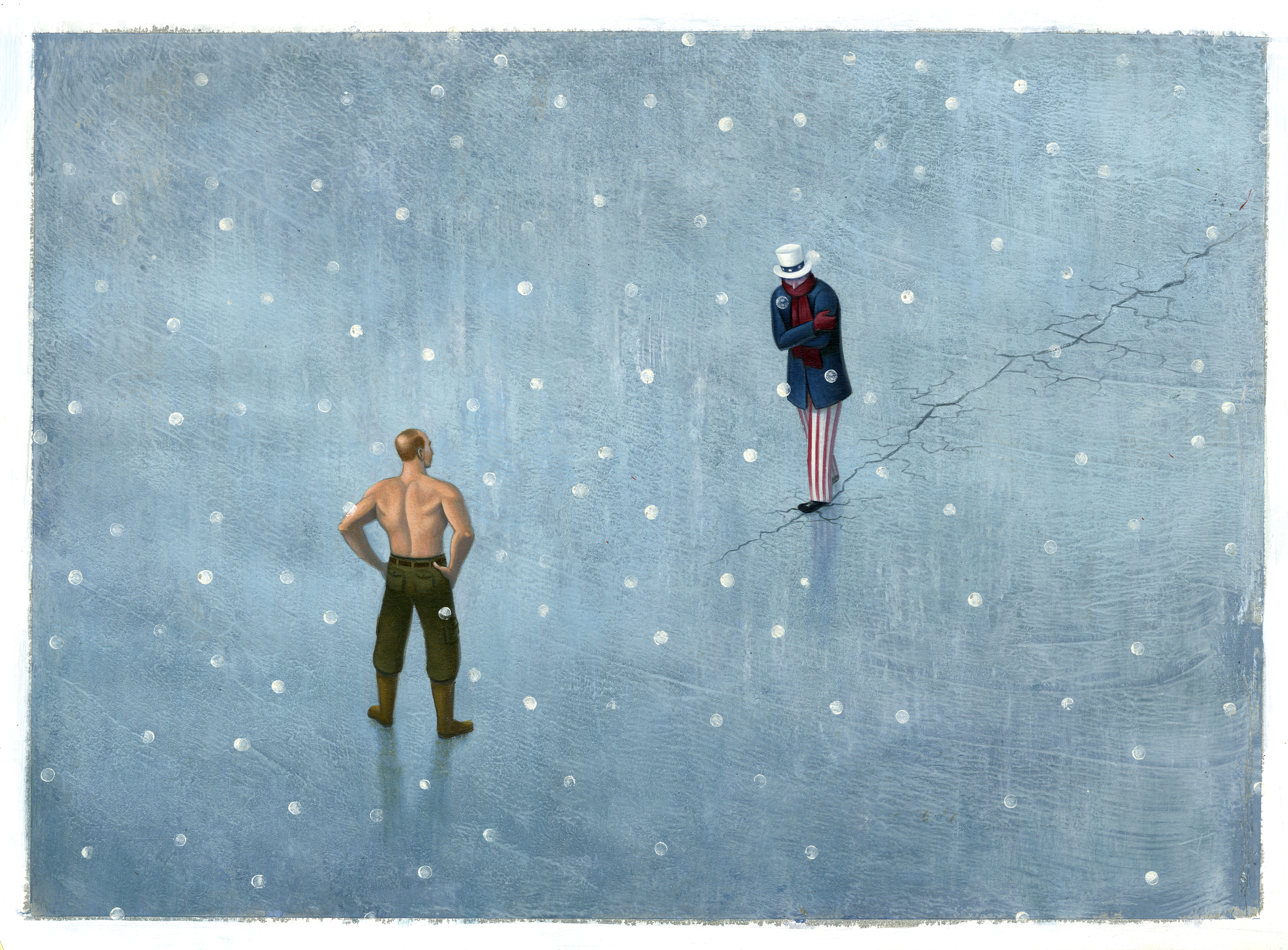2016 is turning out to be the most dangerous year in United States-Russia relations. Trust between the governments of the two countries is extinguished. The United States has sanctioned Russia for its annexation of Crimea and invasion of Eastern Ukraine. Russia has sent troops to Syria to prop up the government of Bashar al-Assad that the U.S. would like to see deposed. The U.S. is sending troops and equipment to Eastern Europe to bolster their defenses. Russia has unleashed a propaganda war against the U.S., spreading disinformation and stirring up anti-U.S. sentiment at home. Arms control deals appear to be falling apart. Russian warplanes buzz U.S. ships and aircraft in the Baltic Sea.
Why is all this happening now, in the last year of the Obama administration? This administration entered office promising a rapprochement or “reset” of relations with Russia, rising from the lows reached in the George W. Bush administration. It canceled the missile shield the Bush administration planned to install in Eastern Europe. Yet, the final year of the Obama administration has become the most dangerous time in United States-Russian relations.
The answer is simple, but troubling: Russia perceives President Obama to be weak and the West in general to be in crisis. As a result, Russia sees 2016 as perhaps the optimal moment to cut the U.S. and the Western alliance down to size.
That Russian President Vladimir Putin sees President Obama as weak should be no secret to anyone who has watched the body language of their meetings together. Rightly or wrongly, Putin perceives Obama’s actions and inactions in Syria as weak. Obama did not stand firm on his announced intentions to punish the Assad regime for its use of chemical weapons. Obama agreed to a nuclear deal with Iran that appears to have failed to meet a number of key U.S. objectives. Whereas President Obama often appears indecisive, President Putin’s moves by contrast appear bold and decisive, even risky.
It is not just the personalities, however, but also the circumstances that make this an ideal time for Russia to strike. The U.S. and the European Union have suffered from significant crises and remain weakened economically and politically. The effects of the global financial crisis fell more heavily on the West than on other world regions, but while the U.S. has returned to growth, at least tentatively, Europe remains in an austerity-induced crisis. Anti-system politics in Europe has reached new highs with Greece suffering from repeated failed bailouts and the U.K. on the verge of a contentious vote on leaving the EU.
In this context, the Putin administration calculates that this year the time is ripe to increase pressure on the West to new heights.
While relatively weak economically and militarily compared to the West, Russia has sought to divide and rule, for instance by uncovering and advertising U.S. spying on European partners through the National Security Administration. Russia plays generous host to Edward Snowden and has hoped to stoke anti-American feeling in Europe. Russia also has sponsored far-right political parties in Europe that oppose the European Union, on the condition that they advocate a pro-Russian foreign policy. Russia seeks to frighten Sweden and Finland, which are considering bids to join NATO, by sending its warplanes to buzz U.S. ships in the Baltic. All of these efforts seem to be intensifying in the wake of the Ukraine crisis.
How can the West respond? Unfortunately, there is no easy way. Opinion in the West remains divided between those who wish to see more engagement with Russia, regardless of its domestic political regime, and those who hope to contain Russia and its influence on neighboring states. The former are afraid of confrontation with a large, nuclear-armed state with an unpredictable leadership. The latter are afraid of Russian sponsorship of anti-liberal forces that could tear apart the European Union and dissolve the Western alliance.
Faced with an opponent that views weakness as an opportunity to project power, there is no question that the best way to address Russia is through a Western projection of strength. But how to project strength when the reality is that the West is divided? The U.S. presidential campaign has demonstrated this clearly, as Republican frontrunner Donald Trump has indicated that he wants a warmer relationship with Russia and views President Putin as someone with whom he can do business, even a role model. While Trump brags about his body parts, Putin actually shows them off in publicly staged photos. Meanwhile, Democratic frontrunner Hillary Clinton takes a hawkish view of Putin and Russia.
Europe, which has closer economic ties with Russia, also remains divided about how to approach Russia, with many Europeans not wishing to anger Russia or to give up on a rich trade and investment relationship. The French Assembly, whose votes are mostly symbolic, recently voted to instruct the government to vote to end the European Union’s sanctions regime against Russia, imposed after the invasion of Crimea and Eastern Ukraine. Yet German Chancellor Angela Merkel seems determined to hold a tough line on Russia, not accepting its aggression toward Ukraine and other Eastern European neighbors and its disinformation and support for anti-EU parties within Germany itself.
Containing Russian ambitions to exert its dominance over Eastern Europe will remain a tough battle. Every election matters. And Russia can be counted on to exert its influence to support those in the West who are ready to overlook Russia’s misdeeds in Ukraine. Yet 2016 has shown that appeasement is not the answer. Russia’s ambitions to be a European great power require a firm response. The U.S. and its Western allies must commit to containing Russia and upholding Western unity now that we see Putin’s challenge more clearly than before.
Mitchell A. Orenstein is a professor of Slavic studies.




